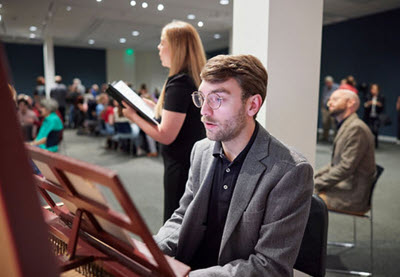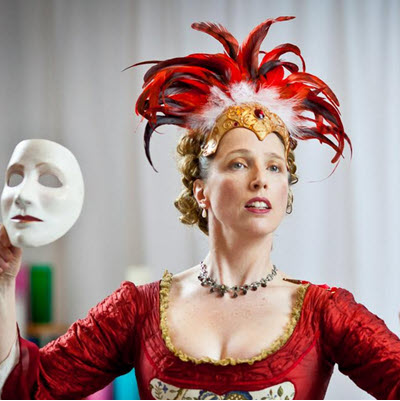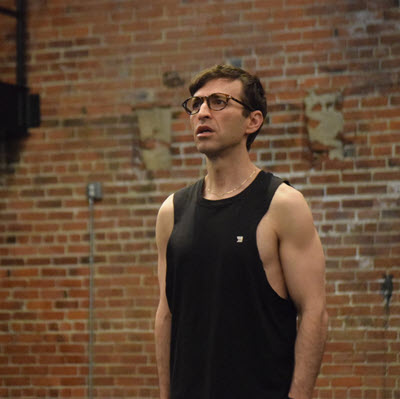by James Bash
Published February 10, 2025
After three decades, the Jefferson Baroque Orchestra brings historical performance to one of the most picturesque areas of the country
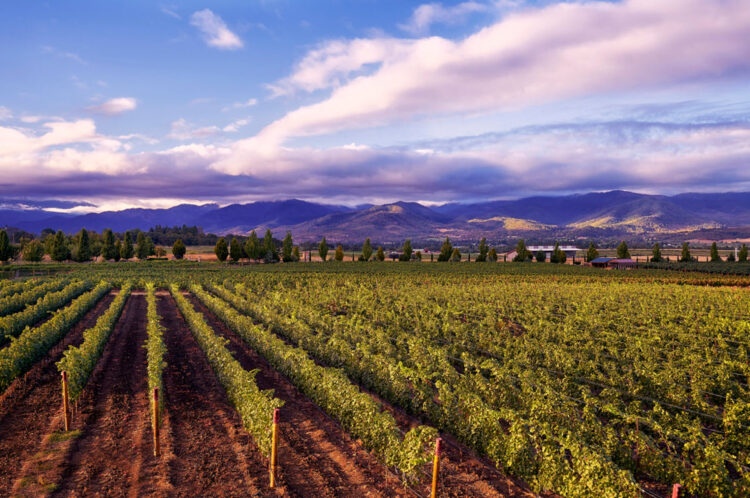
Early music might not be the first thing that you think of when driving along Interstate 5 in Southern Oregon, near the border with California. This part of the state has knockout scenery with the Rogue River, Crater Lake National Park, Mount Ashland, and countless wineries, orchards, and ranches. The area is also known for the Oregon Shakespeare Festival and the Britt Music & Arts Festival. Less well known on the arts-and-culture tourist circuit is the Jefferson Baroque Orchestra and Choir, an ensemble that has presented historically informed performances of Baroque and early music for more than three decades.
The Jefferson Baroque Orchestra’s 31st season continues March 7-9 with three concerts of Telemann’s Tafelmusik I, led by harpsichordist Abigail Mace, who is celebrating her one-year anniversary as the JBO’s artistic director. Their full 2024-25 season covers four different programs — including a holiday Messiah — each performed at churches in the southern Oregon towns of Medford, Grants Pass, and Ashland.
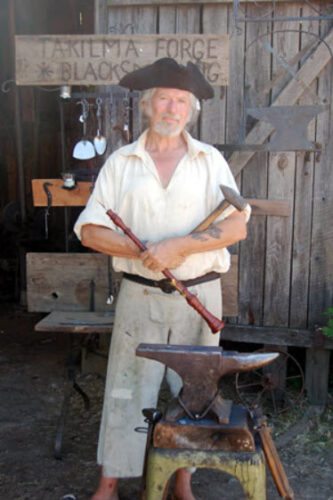
The Jefferson Baroque Orchestra (JBO) shares the same plucky attitude as its founder. The ensemble was started in 1994 by James Rich, who was something of a Renaissance man. Fascinated by all manner of “period instruments,” he sailed on tall ships (inspired, in part, by Patrick O’Brian’s Master and Commander novels), ran an authentic farrier and blacksmith shop, produced recordings for the Musical Heritage Society, helped establish the Oregon Bach Collegium, was a singer, instrumentalist, and, not least, a founding member of Early Music America. In his Takilma Forge & Wagon blacksmith shop, Rich built two kettle drums still used by the JBO.
Rich led these resilient ensembles — the JBO and Collegium — until he suddenly passed away in 2013. He sang and “played many instruments used in early music,” says Rebecca Bittner, current president of the JBO, “and Jim’s enthusiasm was contagious. He encouraged others to discover and perform lesser-known pieces as well.”
Artistic director Mace, an Oregon native, moved to Medford three years ago to perform with the ensemble before taking a leadership role. “I’ve been blown away by how many people know the repertoire and are passionate about performing it,” she says. “It’s like being in a candy shop. I’ve mainly been focused on developing the orchestra on sound, intonation, interpretation.”
Like the local NPR-affiliated Jefferson Public Radio, the JBO takes its name from the mythical “State of Jefferson,” which refers to a large swath of Southern Oregon and Northern California. In the mid-1800s, settlers in the area (mostly in agriculture and mining) felt isolated and ignored by leaders in the regional capitals. Various attempts at independence and statehood never got very far, and the matter was effectively resolved when Oregon became a state in 1859. But the ethos of a free-thinking and proudly independent culture took hold, and the “Jefferson” moniker persists to this day.
A ‘Sure-Fire Boost’
After Rich’s unexpected passing in 2013, the ensemble was led by Margaret Gries, a musicologist at the University of Oregon. She first joined the JBO in 1999 and co-directed the group with Rich, then directed the ensemble on her own until 2018. Violinist and violist Morgan O’Shaughnessey served as the JBO’s artistic director from 2019 till 2022 when he moved to Los Angeles.
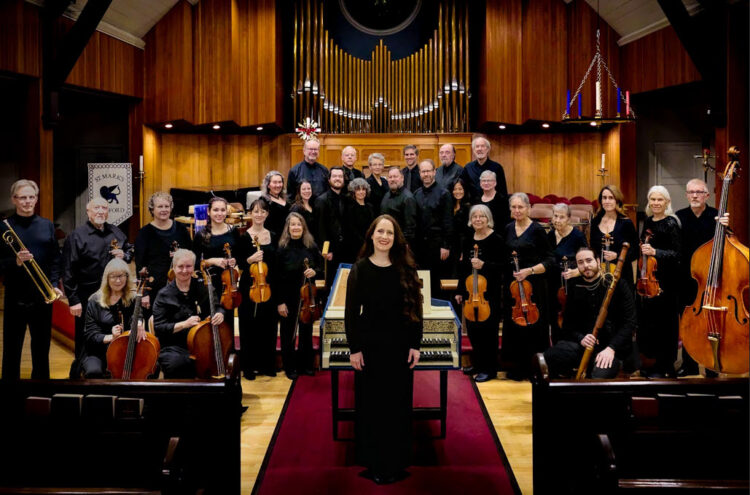
Keyboardist Mace, splitting her energy between piano and harpsichord, received a Fulbright Scholarship to study historical performance at the Royal Conservatory of The Hague, studying with luminaries such as Jacques Ogg, Patrick Ayrton, Michael Chance, Barthold Kuijken, and others. She went on to earn a doctorate at the University of Texas and taught at Oklahoma Baptist University, where she founded the Bison Baroque performance series, taking its name from the OBU mascot.
At Jefferson Baroque, Mace’s background gives the ensemble a firm grounding in early-music repertoire and historical performance styles. She makes all of the artistic decisions, and leads rehearsals and performances from the harpsichord. When devising programs, she can draw from JBO’s broad regional membership, which consists of some 42 instrumentalists and 43 chorus members, almost all of whom live in Southern Oregon. She plays on a two-manual harpsichord in the Flemish style, on loan from the Rogue Valley Symphony — where she serves as the pianist.
“Abigail is leading us back to the real joy and energy that the group needs,” remarked JBO president Bittner. Herself a harpsichordist (and a retired radiologist), Bittner has been affiliated with JBO for the past six years. She lived for a long time in Los Angeles where she collaborated with the Early Music Ensemble of Los Angeles and I Cantori. In addition to the JBO, Bittner also performs with Ensemble Fontegara, devoted to Renaissance recorder repertoire, itself a subgroup of Musica Matrix, which is based in Ashland.
The JBO’s operating budget is tight at a little over $30,000, but both Mace and Bittner see a lot of upside going forward.
“We are growing the season very effectively,” says Bittner. “We have been fortunate enough to acquire some grants and to have some major donors step forward, which has been wonderful for our recovery after the pandemic. It has put us into a position where we can look to the future. We can look at improving our infrastructure to support more concerts and better support our musicians.”
“This year we are going through a growth spurt,” agrees Mace. “Our board of directors has established lofty goals for the group — to become one of the best Baroque ensembles between Eugene and San Francisco — and the grant writing committee has been working hard. We have scheduled more concerts, which requires of course a larger budget. We’ve received grants from the Marie Lamfrom Charitable Foundation and the Oregon Community Foundation, and we have experienced a marked increase in private donations.”
One would think that the JBO would be a natural fit for the Oregon Shakespeare Festival, based in Ashland. But the 90-year-old festival and the 31-year-old orchestra have yet to collaborate. The OSF has three performance spaces, all of them suitable for spoken-word theater but none with a warm or resonant acoustic that are best for music performances. (The OSF does offer outdoor concerts before the evening show, and that might work with some high-end amplification.)
A Programming Mix
Musicians of Jefferson Baroque, made up of professionals and skilled amateurs, receive their parts about six to eight weeks prior to each concert. “Often times, members will then get together and read through the music together in groups of two to four players in their homes,” says Mace. “We then meet as a full orchestra in the week leading up to the concert for an intensive four to six days of rehearsals at St. Mark’s Episcopal Church in Medford.”
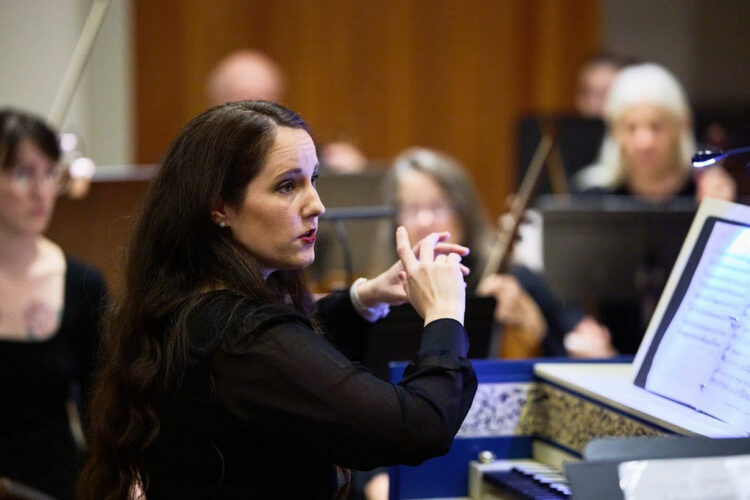
As a programmer, Mace’s vision for JBO involves a concert series with a thematic structure, and some of her concerts pair familiar music with compelling but less known works.
“Each season will cover four broad topics: Exploring the Baroque, Baroque Christmas, Baroque Masterworks, and Showcase — which is like a small chamber ensemble,” Mace explains. This season’s Explore the Baroque concert, for example, was performed in September 2024 and centered on the theme of autumn. It paired the autumn movements from Vivaldi’s Four Seasons, Giovanni Antonio Guido’s Four Seasons, and Pascal Collasse’s Ballet des Saisons. They capped the concert with the J.S. Bach cantata Wer Dank Opfert, Der Preiset Mich, which was first performed in September, 1726.
JBO’s program next month, Tafelmusik, gets the Masterworks slot. Their upcoming Showcase concert, in May, will feature a selection of trio sonatas by Arcangelo Corelli, Jean-Marie Leclair, Handel, and others.
For the Baroque Christmas concert, they paired Handel’s Coronation Anthem No. 2 (“Let thy hand be strengthened”) with the evergreen Messiah. Bittner notes that their Baroque Christmas concert was so popular they had to set up extra chairs to accommodate the overflow. It’s a great problem to have.
James Bash is a writer based in Portland, Ore. His arts journalism has appeared in The Oregonian, The Columbian, Classical Voice North America, Opera, Opera Canada, among other publications. He has also written for the Oregon Arts Commission and the Grove Dictionary of American Music, 2nd edition. For EMA, he wrote about the pasticcio opera Dinner with Handel.

